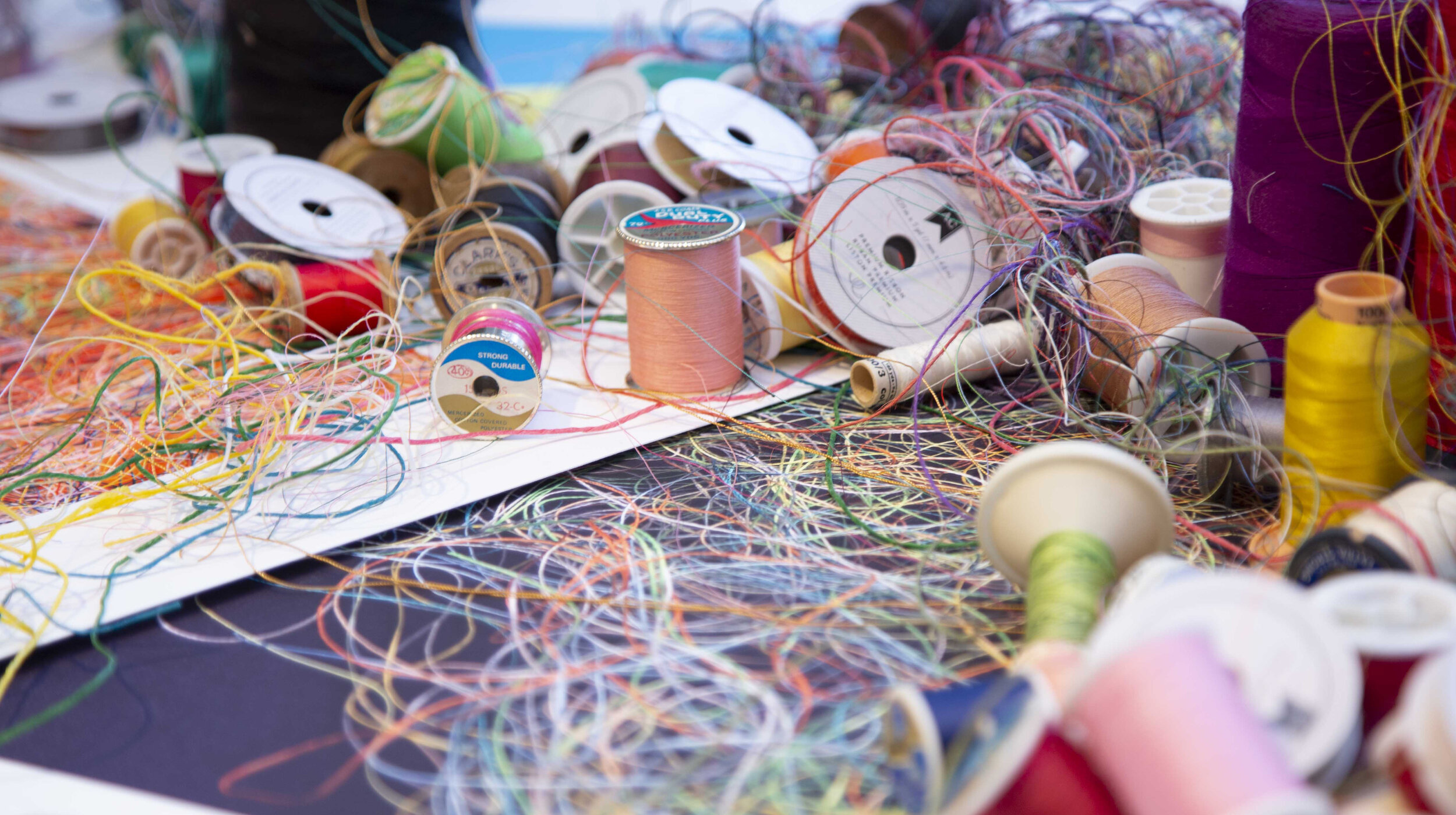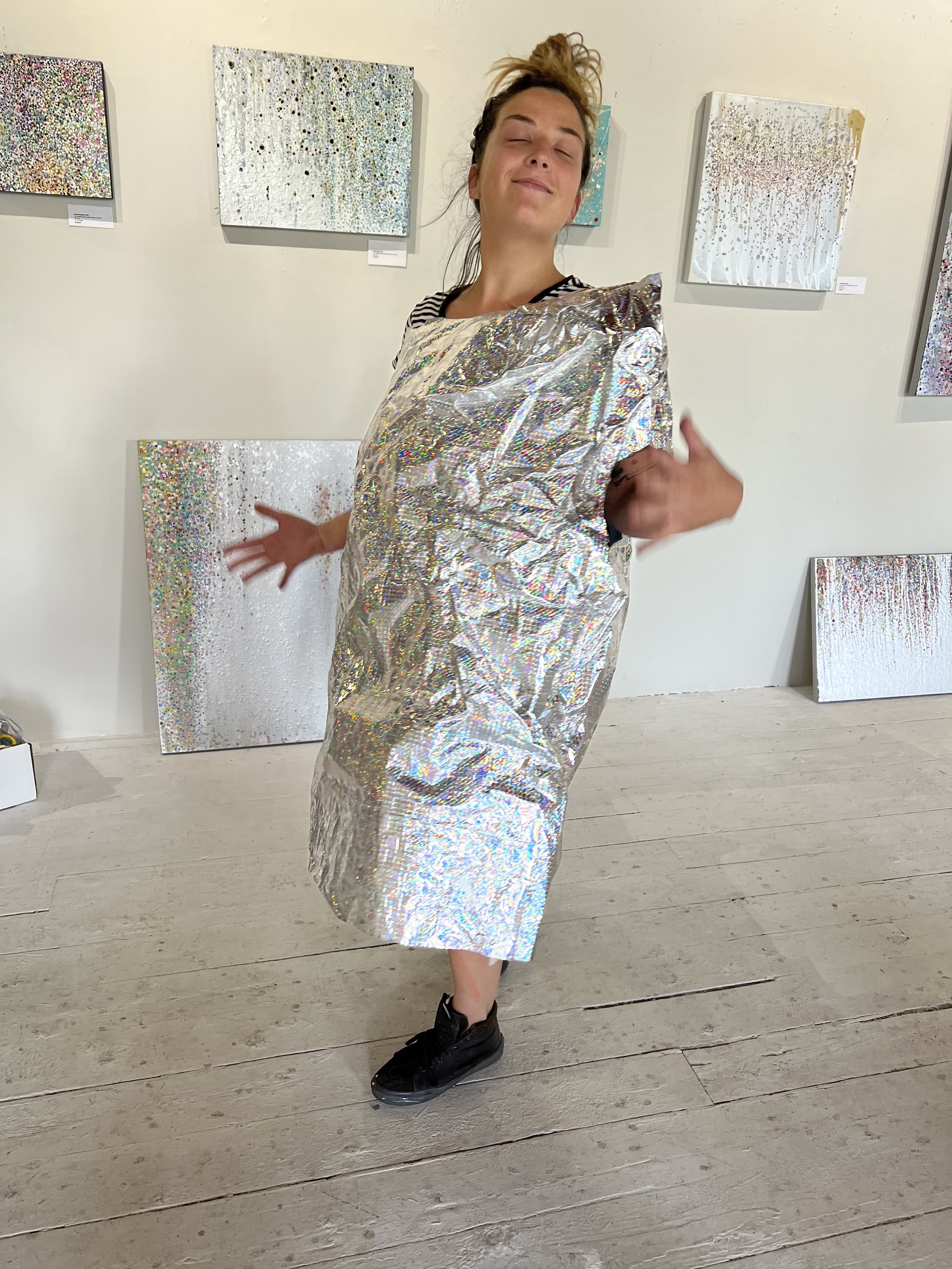
BLOG
HENRY IN MY KITCHEN: THE INGREDIENTS OF AN ARTIST COLLABORATION
In 1981 I worked on a documentary with Michael Marton on the not-yet Pulitzer Prize-winning composer, Henry Brant. Marton’s approach to documentary filmmaking was to embed us with his subjects for a long period. This documentary coincided with when I was working on the drawings featured here, which ultimately led to a collaboration between Henry and me on a piece he did for the Holland Festival called Inside Track.
Here is a story I wrote at the time about just how embedded things could get.
OUT WITH THE OLD
I aspire to being anal compulsive, but I have to hire-out. I create chaos when I work. Things are moved and abandoned on the floor. Since I dip my hands into the paint as I work, I'll pull multiple gloves off and leave them on my paint table. But I like to have everything in order when I start. Paints lined up by color. Brushes by size and type. A place for everything and everything in its place. It's largely because once I am completely engaged in painting, the last thing I want to do is stop and look for a tool or find out I don't have the paint that I need.
A SURGEON’S KNIFE, A PAINTER’S BRUSH: The Intersection of Life and Art
My surgery took six hours. The narcotics kept me comfortable, and the hallucinations were entertaining. At one point I imagined the pillows under my arms were jewel-encrusted, and that they were also paintings that I was working on. And they were coming out so well. (Yes, that was the drugs talking.)
THREADING A NEW PATH: How a Disability Led to a New Artistic Style
In 2018, I developed bilateral trigger thumbs, which meant I could not tie my shoes, write my name, or hold a brush, much less paint. I wanted to keep painting while contemplating the possibility of surgery, but with both hands in metal braces, I had to devise a new way to work.
KYOTO RAIN: To Paint a Memory
Kyoto is an ancient city in Japan that is home to several important Buddhist monasteries. On a rainy day ,I was walking through the grounds on one such monastery. Cherry blossoms had fallen on the sidewalk and were held in place by the moisture of the rain. I photographed the pattern it created. Then years later as I worked on this painting it reminded me of that moment, and, in fact, of that whole extraordinary day.
THE POWER OF THE PERFECT CIRCLE: A Tribute to Giotto's Mastery
I've been having conversations with Giotto di Bondone (c. 1267 - 1337, born in Florence, Italy) since I was twelve years old and my class studied the Renaissance. The conversation became obsessive when in 1987 I created a cycle of paintings recreating the paintings of the Arena Chapel on seven shaped canvases, the largest of which is 18 by 24 feet.
FINDING CREATIVITY IN THE DARK: A Story of Resilience and Art
I lost the use of both thumbs and my hands were in splints for several months.
I knew that my ability to paint was not just in my hands, nor was I the first artist to face this limitation. Renoir suffered from rheumatoid arthritis and his brush had to be strapped to his hand. Chuck Close became a quadriplegic but regained use of his arms. He, too, strapped his brush to his hand and paints, sometimes guiding the right hand with his left.
CONTINUOUS FLOW: A Year of Artistic Exploration
Over the last year I have had several versions of an exhibition that I call, Continuous Flow. The first in Boston at Soprafina Gallery, the second and largest at SUNY Oneonta, and in April, a third at Gremillion and Company, Fine Art, Inc. in Houston, Texas.
These shows came at an interesting time for me. In 2017, as I was preparing for these exhibitions, I lost use of my hands for six months. I had double trigger thumbs, which meant I could not bend my thumbs, write my name, or hold a brush. What to do? I kept working.
THE QUEEN’S SKIRT: A Reflection on Power and Privilege
One day I was moving paintings in the "gallery space" of my studio and I heard the words, "French Revolution". We had just been through a long spate of Trump tantrums and I believe it was that, as much as anything, that brought the French Revolution to mind. I love French history, and while I haven't studied the Revolution in many years, I spent the afternoon in a revery of free association. I was working on some large paintings that are mostly abstract, but with a representational association. And I was using a lot of metallic paint. I decided that I wanted to paint one of those wide, diaphanous skirts worn by Marie-Antoinette
FROM FARM TO CANVAS: Painting the Rural Landscape Slant
I live in a very rural part of New York State surrounded by farms. The landscape influences my work, but not always in the ways you might imagine. I pass this farm on a back road to the next town. I have stopped a few times to photograph it. What I really love is how the corn crib looks in front of the silo. It is a curved grid in front of a curved grid. In this photo it appears quite abstract. I love a subject that is completely real and seems completely abstract.
THE GRID PROJECT - PART THREE : Translating into Paint
From the start, I knew that I wanted to make paintings from the broken television "grid" photographs, but they posed a lot of technical difficulties. To begin with, I paint in oils. Making a clean stripe in oil is more difficult than with acrylic paint. With acrylics you can mask out your stripes with tape and then seal it with a clear acrylic layer, then add your color and it won't bleed. That pretty much insures that you will have a sharp edge.
ABSTRACT OR REPRESENTATIONAL : Depends on the Source of the Light
My paintings are about light.
When I paint representationally and I am about the business of rendering light, I often choose a subject that is backlit. It seems to offer the most extensive and complex qualities of light - light on a surface, passing through a surface, reflecting off of a surface, often highlighting transparency, translucency, reflection, or glitter.
18TH CENTURY JAPANESE SCREEN
Several years ago as I crossed the Mall in Washington on my way back to my hotel, I decided I had to duck into the Freer Gallery of Art and Arthur M. Sackler Gallery, part of the Smithsonian, and see the Asian work there. On display was the Price Collection, on loan from Los Angeles. The first piece I saw as I entered the exhibition was "Pine and Plum Trees in Snowstorm" by Katsu Jagyoku, the 18th Century Japanese artist.
The room was dimmed and soft light fell on an enormous screen with branches and falling snow. I felt completely enveloped by the piece. I had both a calm and emotional response to it, a feeling that has stayed with me to this day.
THE PRINT PROJECT AND IT’S AFTERMATH
Several years ago I decided that I wanted to do a set of lithographs based on a painting I did of an almond tree. Having never made a lithograph before I thought I'd share the process with you and get your input along the way.
I made 4-plate lithograph, that I printed in different colors to represent different times of the day.


















